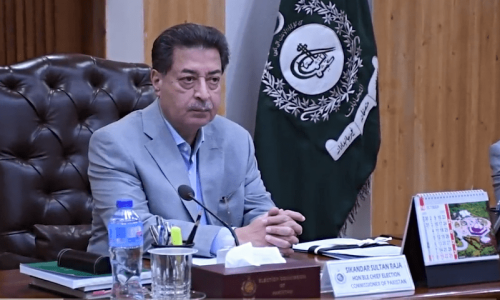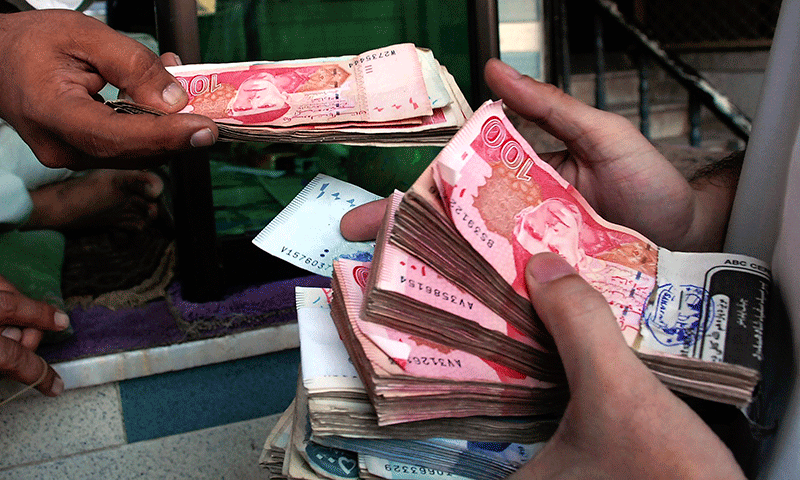“I am in the profession of construction of Oadki houses (mud houses) since the last 47 years, when I was only 13 years old,” says Arjun Oad from Dadu. His father and uncle were also experts in the art of constructing mud houses and walls. He says that the buildings made of mud were very strong and long-lasting back in the 80s and lasted for more than 20 years, but now they do not last for even two years.
A major reason for this is the increasing water-logging due to which after a short time the foundation becomes weak and the houses collapse as do the walls erected around them.
Besides this, the demand for Oadki houses is witnessing a decline since the last many years because of the introduction of brick houses, he says.
The declining demand of mud houses have rendered Oad jobless. Oad, like some other members of his community, tried to adopt some other profession like agriculture but could not do well due to a lack of required skills, which made it very difficult for him to feed his children in these times of increasing inflation.
He further says that though the opportunities for construction of mud houses have declined in Sindh, in Punjab and Balochistan, the tradition of mud houses still exits, as the problem of water-logging was less as compared to Sindh.
The majority of the Oad community moved to Balochistan and Punjab in search of work and initially succeeded in finding some but then other social problems made their lives quite miserable. For instance, in Punjab, there is a major issue of discrimination against lower-class Hindus and people avoid sitting or eating with them; the children of the Oad community are not allowed to attend schools where the local children go.
Similarly, in Balochistan, due to low payment for their work and other factors, the Oads are forced to take loans from the sardars which accumulate as they are unable to pay back. A large number of community members were held hostage by local Sardars due to rising debts.
Once the Oads entered into a formal contract with the locals in Balochistan for construction, they became bound to spend their lives according to the will of the sardar or the locals; for instance, if there is a shop owned by some local in the area, the Oad cannot buy from any other shop.
“If there is even a minor fault in the construction of the house, an Oad has to reconstruct it after demolishing it, without being paid extra for reconstruction,” Arjun says.
Some of the community members have started to work in brick kilns, but there too the situation is not favourable. Low wages in spite of long working hours lead to accumulating debts; the situation is especially bad in Hyderabad, Umerkot, Nawabshah and Mirpurkhas.
Field Engineer, Frontier Works Organisation (FWO), Rafique Rahman Panhwar says that the trend of the construction of houses with kiln bricks had been introduced due to the social change in society and the improving financial condition of the people. Also, the fact that due to water-logging the mud houses do not last as long as brick-built houses or walls, forced the people towards new technology of construction, he added.
The mud house remains cool even at a temperature of more than 50 C as compared to the kiln brick house and in addition, the cost of mud houses is very low, he said.
“The Oad community has the best skills for the construction of mud houses but these skills are going to waste because of the new trend of brick-built houses, and unemployment is also increasing among the community,” Panhwar says.
Oad is a Hindu Rajput community and a tribe with origins in Sindh and Punjab in Pakistan and Rajasthan in India. The tribe has a distinct and unique history dating back thousands of years. However, not much is documented about this tribe.
One of the earliest references to the Oads is found in the poetry of Shah Abdul Latif Bhitai, who praised the Oad community for their hard work and simplicity.
During the reign of Mughal emperor Aurangzeb Alamgir, some Oads converted to Islam. The Muslim Oads in Pakistan follow the strict Sunni Ahle Hadith school.
In 1956, the Pakistan government declared about 32 castes and tribes as scheduled castes in the country. Scheduled castes are also called lower caste Hindus or Pakistani Dalits. The majority of them are lower caste Hindus such as Kolhi, Menghwar, Bheel, Bagri, Balmaki, Jogi and the Oad.
The community is in dire need of support for developing their skills in other professions which can help them escape the trap of poverty, unemployment and deprivation.














































Dear visitor, the comments section is undergoing an overhaul and will return soon.